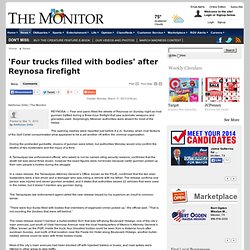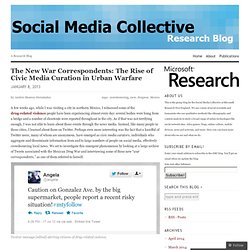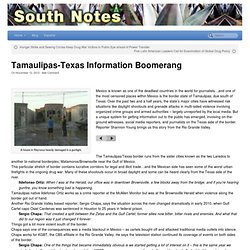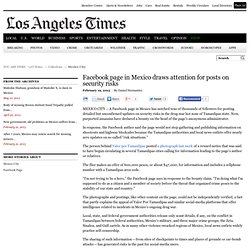

How Twitter, social media impacts Mexico’s drug war. Austin, Texas — Twitter, but increasingly Facebook and YouTube, are becoming essential elements to the way ordinary people in Mexico protect themselves from the war on drugs, according to experts sitting on a panel at South By Southwest Interactive called, “ Life on the Line: Tweeting the Drug War .” Panelists included University of Texas at Brownsville professor Guadalupe Correa-Cabrera, and journalists Melissa Del Bosque and Sergio Chapa.
Correa-Cabrera spoke about a study she’s been doing specifically on the border state of Tamaulipas, which she said is characterized by being the “cradle” of the Zetas cartel, having more bridges to the U.S. than any other Mexican state, and especially the city of Reynosa has seen much more violence than other areas. After Mexican President Felipe Calderón declared war on the drug cartels in 2006, and then in 2010 when the Zetas and Gulf Cartel stopped working together, the violence exploded, Correa-Cabrera said.
About Sara Inés Calderón ( 109 Posts ) 'Four trucks filled with bodies' after Reynosa firefight. REYNOSA — Fear and panic filled the streets of Reynosa on Sunday night as rival gunmen battled during a three-hour firefight that saw automatic weapons and grenades used.

Surprisingly, Mexican authorities were absent for most of the melee. The opening clashes were reported just before 9 p.m. Sunday, when rival factions of the Gulf Cartel consummated what appeared to be a yet another rift within the criminal organization. During the protracted gunbattle, dozens of gunmen were killed, but authorities Monday would only confirm the deaths of two bystanders and the injury of a third. A Tamaulipas law enforcement official, who asked to not be named citing security reasons, confirmed that the death toll was about three dozen, however the exact figures were not known because cartel gunmen picked up their own people’s bodies during the struggle. The Tamaulipas law enforcement agent called the new release issued by his superiors an insult to common sense. The New War Correspondents: The Rise of Civic Media Curation in Urban Warfare. A few weeks ago, while I was visiting a city in northern Mexico, I witnessed some of the drug-related violence people have been experiencing almost every day: several bodies were hung from a bridge and a number of shootouts were reported throughout in the city.

As if that was not terrifying enough, I was not able to learn about those events through the news media. Instead, like many people in these cities, I learned about them on Twitter. Perhaps even more interesting was the fact that a handful of Twitter users, many of whom are anonymous, have emerged as civic media curators, individuals who aggregate and disseminate information from and to large numbers of people on social media, effectively crowdsourcing local news. We set to investigate this emergent phenomenon by looking at a large archive of Tweets associated with the Mexican Drug War and interviewing some of these new “war correspondents,” as one of them referred to herself. Tamaulipas-Texas Information Boomerang. A house in Reynosa heavily damaged in a gunfight.

Mexico is known as one of the deadliest countries in the world for journalists…and one of the most censored places within Mexico is the border state of Tamaulipas; due south of Texas. Over the past two and a half years, the state’s major cities have witnessed risk situations like daylight shootouts and grenade attacks in multi-sided violence involving organized crime groups and armed authorities – largely unreported by the local media.
Facebook page in Mexico draws attention for posts on security risks. MEXICO CITY -- A Facebook page in Mexico has notched tens of thousands of followers for posting detailed but unconfirmed updates on security risks in the drug-war hot zone of Tamaulipas state.

Now, purported assassins have declared a bounty on the head of the page's anonymous administrator. In response, the Facebook author said the page would not stop gathering and publishing information on shootouts and highway blockades because the Tamaulipas authorities and local news outlets offer nearly zero updates on so-called "risk situations. " The person behind Valor por Tamaulipas posted a photograph last week of a reward notice that was said to have begun circulating in several Tamaulipas cities calling for information leading to the page's author or relatives. The flier makes an offer of 600,000 pesos, or about $47,000, for information and includes a cellphone number with a Tamaulipas area code. Advice for Drivers Heading to Mexico for Holidays. Every year around the Christmas holiday, Mexico’s northern border crossings are inundated with travelers on road trips from the U.S. to visit families in Mexico.

It can be a dangerous trip, given the ongoing drug war and general lack of security on Mexico’s northern highways. In its most recent travel warning for Mexico, the US State Department urges citizens to defer all non-essential travel to much of northern Mexico, including all states which share a border with Texas. Still, thousands go, pulled by family ties this time of year. There are a number of things that highway travelers can do to minimize their risk exposure in northern Mexico. The easiest is to carefully choose the time of day when they travel. Blasita López: “We’ve seen their trend change in the sense that they only travel during the day. Blasita López directs the tourism bureau in Laredo, Texas. Blasita López: “We’ve had overflow areas that we prepare as a city.
(Man gives report via Zello)